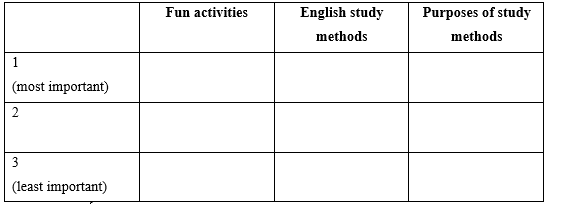Giải SGK, SBT Unit 1. English in the world iLearn Smart World
Giải SGK, SBT Unit 1 iLearn Smart World
d. Match the actions to the purposes, then write complete sentences.
(Nối hành động với mục đích, sau đó viết các câu hoàn chỉnh.)
|
Actions (Hành động) |
Purposes (Mục đích) |
|
1. I use different study methods (Tôi sử dụng các phương pháp học tập khác nhau) |
understand the actors’ words (hiểu lời diễn viên) |
|
2. He turns subtitles on (Anh ấy bật phụ đề lên) |
read the song’s words (đọc lời bài hát) |
|
3. We note down new words (Chúng tôi ghi lại những từ mới) |
improve all four skills (cải thiện cả bốn kỹ năng) |
|
4. They listen to music with lyrics (Họ nghe nhạc có lời) |
look for mistakes (tìm kiếm sai lầm) |
|
5. She goes over her writing (Cô ấy xem lại bài viết của mình) |
know their meanings (biết ý nghĩa của chúng) |
|
6. I look new words up (Tôi tra từ mới) |
look them up later (tra cứu chúng sau) |
a. Read the definitions, then fill in the blanks with the new words. Listen and repeat.
(Đọc các định nghĩa, sau đó điền vào chỗ trống với các từ mới đó. Nghe và lặp lại.)
|
essential: extremely important and necessary (thiết yếu: cực kỳ quan trọng và cần thiết.) international: involving two or more countries (quốc tế: liên quan đến hai hoặc nhiều quốc gia.) overseas: connected with other countries, usually countries across the sea (ở nước ngoài: kết nối với các quốc gia khác, thường là các quốc gia trên biển.) foreign: belonging to or coming from another country, not your own (nước ngoài: thuộc về hoặc đến từ một quốc gia khác, không phải của riêng bạn.) worldwide: in all parts of the world (toàn cầu: ở mọi nơi trên thế giới.) opportunity: a situation making it possible for you to do something (cơ hội: một tình huống giúp bạn có thể làm điều gì đó.) content: the information or ideas in a book, speech, film, or an online article (nội dung: thông tin hoặc ý tưởng trong một cuốn sách, bài phát biểu, bộ phim hoặc một bài báo trực tuyến.) career: a job or series of jobs that you do for a long period of your life (sự nghiệp: một công việc hoặc một loạt công việc mà bạn làm trong một thời gian dài của cuộc đời.) |
1 . My city has a large international airport we can use to fly to different countries.
2 . Studying in Singapore will give you a(n)_____ to practice English.
3. If you understand English, you can enjoy a lot more ________ on the internet.
4. Learning English will be useful for your future __________ because many jobs require it.
5. One day, I want to travel ___________ to America or Canada.
6. People speak English __________. They use it all around the world.
7. Many people in my country choose to leave home and study in a(n) _____ country.
8. If you want to study in another country, it is _________to learn English.
a. Read about using sequence words to organize your writing, then read the email again and circle the sequence words.
(Đọc về việc sử dụng từ nối để tổ chức bài viết của bạn, sau đó đọc lại email và khoanh tròn các từ nối.)
|
Writing Skill (Kĩ năng viết) Using sequence words to organize your writing (Sử dụng các từ tuần tự để sắp xếp bài viết của bạn) To show the order or importance of ideas, you can use the ordinal numbers first, second, third,... and the adverb finally. (Để thể hiện thứ tự hoặc tầm quan trọng của ý tưởng, bạn có thể sử dụng các số thứ tự first, second, third,... và trạng từ finally.) We use sequence words to organize our writing. They make our writing easier to read and our ideas easier to understand. We use them at the beginning of a sentence and write a comma after them. (Chúng ta sử dụng các từ tuần tự để tổ chức bài viết của mình. Chúng làm cho bài viết của chúng ta dễ đọc hơn và các ý tưởng của chúng ta dễ hiểu hơn. Chúng ta sử dụng chúng ở đầu câu và viết dấu phẩy sau chúng.) First, learn how to say some new English words. (Đầu tiên, hãy học cách nói một số từ tiếng Anh mới.) Second, practice saying the words to a partner. (Thứ hai, thực hành nói những từ đó với bạn của em.) Third, practice listening to your partner saying them. (Thứ ba, hãy tập lắng nghe bạn của bạn nói những từ đó.) Finally, try to use them in a real-life English conversation. (Cuối cùng, hãy thử sử dụng chúng trong cuộc trò chuyện tiếng Anh thực tế.) |
a. Read the article about methods of learning English. What is the main message?
(Đọc bài viết về phương pháp học tiếng Anh. Thông điệp chính là gì?)
1. There are lots of ways to learn.
(Có rất nhiều cách để học.)
2. There is one good way for each person.
(Mỗi người có một cách tốt.)
3. If you don't practice everyday, you won't learn.
(Nếu bạn không luyện tập hàng ngày, bạn sẽ không học được.)
|
Are you finding it difficult to learn English? Don't worry! I'm here to help. Everyone learns differently. Maybe one or two of the ideas below will make it easier. 1. Turn on the English subtitles You can learn English while watching your favorite TV shows in your native language. Turn on the English subtitles and read them while the people are speaking. 2. Note down new words you learn Do you often try to learn something new and then forget it? Keep a note to note down new words and phrases, then look up their definitions. Then, use them later when you practice speaking. 3. Sing along to music If you like English music, you should start singing along. You can find the lyrics online and read them while you listen to your favorite song. After that, sing along to your favorite English songs loudly and proudly to help you say the words in the future. 4. Practice every day You should try to use new English words, phrases, and sentences you learned every day. Go over the notes you made in your notebook, and it will help you remember them better. I hope that helps. There are so many ways to learn. Find the ways that work best for you! |
a. Read an email between two pen pals. Choose the best subject for the email.
(Đọc một email giữa hai người bạn qua thư. Chọn chủ đề tốt nhất cho email.)
1. Re: I need your help!
(Tôi cần bạn giúp!)
2. Re: I need some new books and TV shows to watch
(Tôi cần một số sách và chương trình truyền hình mới để xem)
3. Re: How is your new school?
(Ttrường mới của bạn thế nào?)
New message
To: HaoN@English-Speaking-Pen-Pal.com
From: JamesH@English-Speaking-Pen-Pal.com
Subject:
Hey Hao,
It was nice to hear from you. I'm great, thanks. My new school is amazing. Of course I can give you some ideas to improve your English.
First, you can read some books in English. You should check out the Benny's Life books. They're my favorite. You can underline the words you don't know and write them in a notebook. I think you should also write them in Vietnamese.
Second, you can search for worksheets for the topics you're studying. You can do the activities and double-check your answers with your friends or sister. Sometimes, if they're too difficult, remember to check the level of them and make sure you find the right level. This will help you improve.
Finally, you can watch TV shows in English. You can listen to the actors speak and then try to copy what they say. It can be quite difficult, but you can turn the subtitles on to help you. It will really improve your pronunciation. It might also help you learn some new words and phrases, too.
I really hope some of these ideas will help you. I'll try and think of some more ideas and let you know.
Speak soon,
James
Writing Skill
|
Writing Skill (Kĩ năng viết) Using sequence words to organize your writing (Sử dụng các từ tuần tự để sắp xếp bài viết của bạn) To show the order or importance of ideas, you can use the ordinal numbers first, second, third,... and the adverb finally. (Để thể hiện thứ tự hoặc tầm quan trọng của ý, bạn có thể sử dụng các số thứ tự first,second,third,... và trạng từ finally.) We use sequence words to organize our writing. They make our writing easier to read and our ideas easier to understand. We use them at the beginning of a sentence and write a comma after them. (Chúng tôi sử dụng các từ tuần tự để tổ chức bài viết của mình. Chúng làm cho bài viết của chúng ta dễ đọc hơn và ý tưởng của chúng ta dễ hiểu hơn. Chúng ta sử dụng chúng ở đầu câu và viết dấu phẩy sau chúng.) First, learn how to say some new English words. (Đầu tiên, hãy học cách nói một số từ tiếng Anh mới.) Second, practice saying the words to a partner. (Thứ hai, thực hành nói những lời đó với đối tác.) Third, practice listening to your partner saying them. (Thứ ba, hãy tập lắng nghe đối tác của bạn nói những điều đó.) Finally, try to use them in a reallife English conversation. (Cuối cùng, hãy thử sử dụng chúng trong cuộc trò chuyện tiếng Anh thực tế.) |
Read the sentences below. Write numbers in the boxes to put the sentences in order of importance, then write sequence words in the blanks.
(Đọc đoạn văn phía dưới. Viết các số vào các ô để sắp xếp các câu theo thứ tự quan trọng, sau đó viết các từ tuần tự vào chỗ trống.)
|
|
,you should search for the lyrics online so you can read the words while you listen. (bạn nên tìm kiếm lời bài hát trực tuyến để có thể đọc lời trong khi nghe.) |
|
|
,you could invite your friends to sing along with you. (bạn có thể mời bạn bè hát cùng bạn.) |
|
|
,you can write down new words and phrases in a notebook. (bạn có thể viết ra những từ và cụm từ mới vào một cuốn sổ.) |
|
1 |
First, you need to find a song that you like and has English slightly above your own language level. (Đầu tiên, bạn cần tìm một bài hát mà bạn thích và có trình độ tiếng Anh cao hơn trình độ ngôn ngữ của bạn một chút.) |
Complete the table with three activities you can do to practice English at home. Order the activities in levels of importance. For each activity, write the study method and its purpose.
(Hoàn thành bảng với ba hoạt động bạn có thể làm để luyện tập tiếng Anh ở nhà. Sắp xếp các hoạt động theo mức độ quan trọng. Đối với mỗi hoạt động, hãy viết phương pháp nghiên cứu và mục đích của nó.)
|
|
Fun activities (Hoạt động vui chơi)
|
English study methods (Phương pháp học tiếng Anh)
|
Purposes of study methods (Mục đích của phương pháp nghiên cứu) |
|
1 (most important) (quan trọng nhất) |
|
|
|
|
2 |
|
|
|
|
3 (least important) (ít quan trọng nhất) |
|
|
|


















